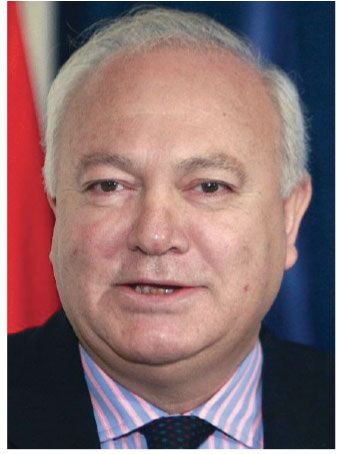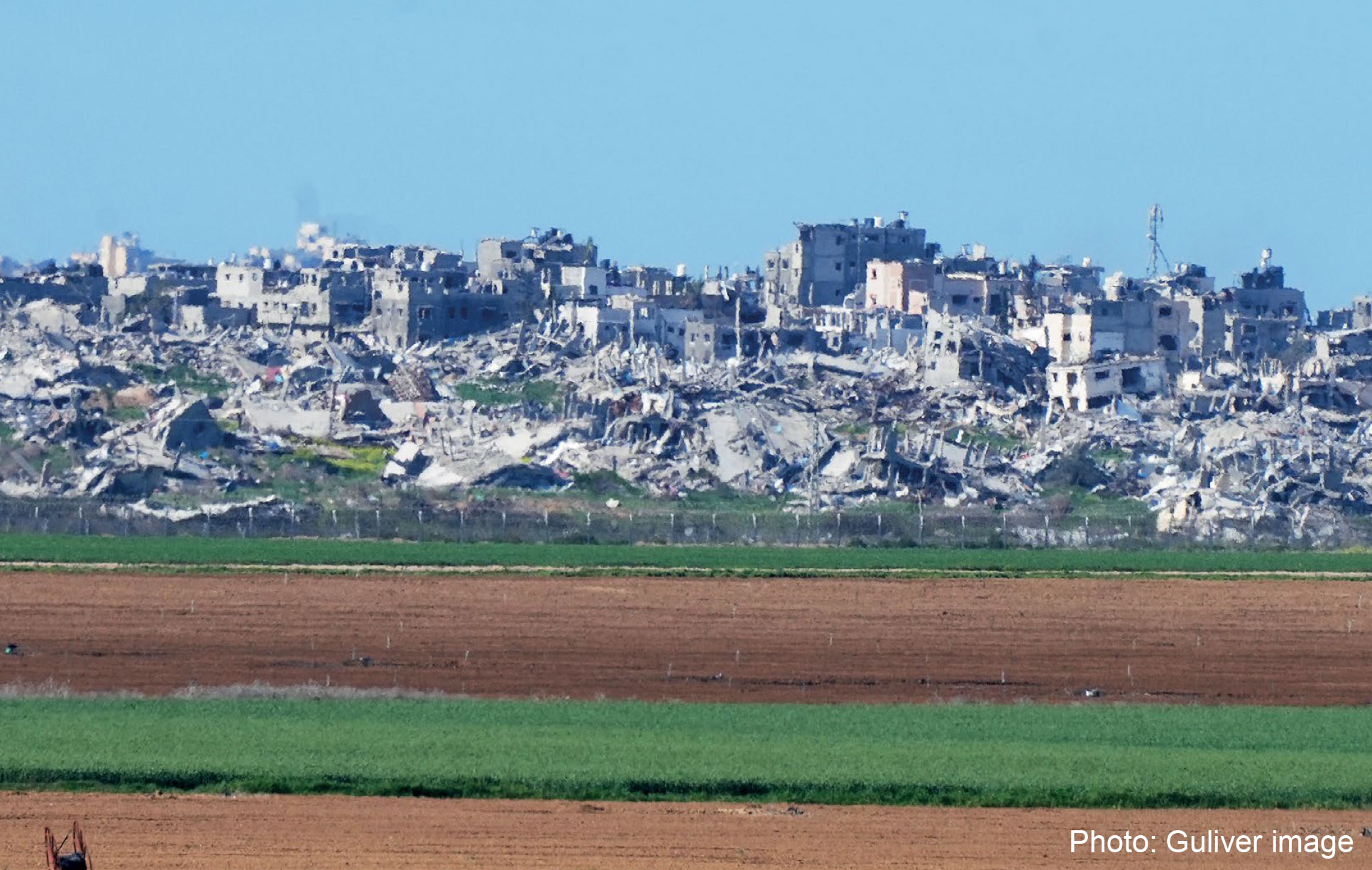 Miguel Ángel Moratinos is the United Nations Under-Secretary-General holding the post of High Representative for the United Nations Alliance of Civilizations, having formerly served as the Minister of Foreign Affairs, European Union, and Cooperation of Spain and the EU’s Special Representative for the Middle East. You may follow him on X @MiguelMoratinos.
Miguel Ángel Moratinos is the United Nations Under-Secretary-General holding the post of High Representative for the United Nations Alliance of Civilizations, having formerly served as the Minister of Foreign Affairs, European Union, and Cooperation of Spain and the EU’s Special Representative for the Middle East. You may follow him on X @MiguelMoratinos.
“Any man’s death diminishes me because I am involved in mankind.”
These beautiful words from sixteenth-century English metaphysicist and poet John Donne, included in Nuccio Ordine’s last book Men Are Not Islands (2023), evoke the transcendent question of protecting the life of every single human being. While some may find this futile, I firmly believe that the gravity of the situation in the Middle East demands a call for peace. We must save lives and legitimately proclaim that “enough is enough.” Enough of the endless death and international passivity, for such inaction cannot put an end to this dramatic situation.
No one can or should justify Hamas’s attacks and its dehumanizing acts of October 7th, 2023. One of the main priorities will thus continue to be the unconditional liberation of the Israeli hostages—the sooner the better. But neither can we sit back and do nothing as the dramatic situation in Gaza unfolds before our eyes, where in addition to Hamas being the main target of Israeli military action, much of the Palestinian civilian population remains on the receiving end of all the destruction.

The aftermath of destruction in Northern Gaza
This is not only an existential conflict between two communities, nations, and narratives—the Israeli and Palestinian. What is at stake is the credibility and viability of a system of international governance that has proven itself incapable of stopping a dehumanizing trend that is already shaping up to become one of the most fateful moments in human history.
Since the beginning of time, violence and the desire to annihilate the adversary have brought unspeakable episodes of death and destruction. In the aftermath of the two world wars in the mid-twentieth century, humanity agreed to stop barbarism under the slogan “never again.” For this reason, a system of international governance was created—one that seemed to be inspired by the ancient prophecy of Isaiah (2:4): “He will judge between the nations and will settle disputes for many peoples. They will beat their swords into plowshares and their spears into pruning hooks. Nation will not take up sword against nation, nor will they train for war anymore.”
Unfortunately, during the second half of the twentieth and the beginning of the twenty-first century, this prophecy was not fulfilled, and humanity has continued to bleed in multiple conflicts.
Among such conflicts, I would highlight two in which the consequences of war were amplified by manipulation, lies, and disinformation, all used as weapons to justify military interventions that were otherwise inexcusable and useless. The so-called Pentagon Papers, partially leaked in 1971 and fully declassified 40 years later, revealed the falsehood of the objectives, approaches, and very raison d’être of the Vietnam War. This was a conflict that resulted in the commencement of the war era, with millions of Vietnamese victims and hundreds of thousands of American casualties leaving a horrendous trauma for the succeeding generations of both countries.
The second and more recent one was the Iraq War. While the exact figures remain elusive, the estimates suggest that almost a million people died during the conflict itself, with the number rising exponentially in the years that followed the initial U.S. invasion. The death toll is now estimated to amount to almost 3 million due to the so-called “war on terror.”
The U.S. military intervention in Iraq opened Pandora’s box in the region with consequences that continue to manifest themselves today through successive and sinister terrorist franchises. In this case too, one of the main victims was the truth, as demonstrated by the independent 2016 Report of the Iraq Inquiry, whose author, John Chilcot, examined the UK’s involvement in the conflict. The report’s conclusions firmly established the existence and use of lies and manipulation in order to legitimize a military intervention that ran counter to international law.
We are still far from drawing the right lessons from our past mistakes. Not only do we continue to “raise the sword,” pit “one nation against another,” and “train men for war,” but we also continue to engage in lies, twisted justification, and disinformation. Together, these continue to underpin the “logic of war,” undermining peace proposals and diplomatic negotiations.
In these tragic days, Israelis and Palestinians are not only jeopardizing their present, but this war also impacts their future existence. Now, at a time of utmost difficulty, they both must get out of this labyrinth of destruction and horror. In doing so, the international community should live up to its name, assume responsibility, and make effective use of its available instruments. The first such tool is its declarative capacity, which can be substantiated in the United Nations Security Council by demanding a ceasefire without hesitation. It is not possible to justify the continuation of military operations and the unbearable death toll, which now exceeds 30,000 Palestinians and 2,000 Israelis. The immediate and unconditional release of Israeli hostages held by Hamas is also imperative.
The international community must abandon double standards in the management and resolution of international conflicts. Any violation of international humanitarian law is intolerable and, as such, must be unequivocally condemned throughout the world and on all occasions, both in Ukraine and in the Israeli-Palestinian conflict.
It is important to highlight the work conducted by humanitarian actors to limit and mitigate the suffering of the population in Gaza, without forgetting that to stop the humanitarian tragedy, guns must be silenced. The responsibility of international organizations goes beyond the commendable work of “humanitarian agencies.”
Once a sustainable ceasefire has been achieved, the “politics” should assume the role of the main protagonist. What we have been witnessing until now has been an exclusively “security-based” strategy in solving the delicate complexities of the Israeli-Palestinian conflict. Predictably, such an approach has thus far not yielded a positive outcome.
A plan should be prepared in advance by the international community and supported by its principal actors. Peace and stability in the Middle East are essential to the whole world. Peace in the region is also vital for Europe, since the Middle East geographically forms the old continent’s closest neighborhood. Moreover, regional peace has been and continues to be one of the United States’ greatest challenges in international affairs due to Washington’s historic commitment to Israel as an independent state. The region’s affairs affect China as well, because of its dependency on Middle Eastern energy resources. Finally, achieving peace is crucial for the entire Arab world and the Gulf states, as it concerns their existence and future. The world cannot accept not finding a settlement for the “Palestinian question.” No other issue has been discussed, referred to, or addressed more than the Israeli-Palestinian conflict in the whole history of the UN.
Therefore, a new plan should be presented in the form of a peace project that should be endorsed and adopted by the international community. It will serve as an imposed framework to establish the main general terms of the final agreement, leaving the concrete negotiations on borders, settlements, security, refugees, and the status of the city of Jerusalem, among other issues, to the parties involved.
In the scope of this new proposal, the recognition of the Palestinian state should be at the forefront of any political process to fulfill the “two-state solution” formula. We already know what other options and alternatives have brought. Half-measures and declarations of intent are no longer useful.
Secondly, we should continue working to prevent the expansion of the Israeli-Palestinian conflict in the region. The fragility of the situation in Lebanon and Yemen, as well as the questionable role of Iran in the region should be addressed concurrently.
Thirdly, it is now, when mutual trust has been lost, that the international community should create conditions for building respect and reconciliation. There is an urgent need to rebuild a “peace camp” in both societies so that their citizens can reconnect and engage in a sincere and fruitful dialog.
We must also fight relentlessly against rampant anti-Semitism and growing Islamophobia. In many of these tasks, the United Nations Alliance of Civilizations can contribute in tangible ways. In the post-conflict stage, there will be an enormous task of reconstruction, in which we shall help both parties with determination and commitment to find the path of hope.
As the German poet Johann Wolfgang von Goethe once wrote, “He who moves not forward goes backward.” Inaction is not an option. Israelis and Palestinians deserve a future of dignity and peace, free from this existential crisis that, if continued, will only bring more fear, anguish, and insecurity. The solution lies in having two states in peace and security.







